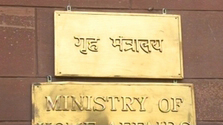
New Delhi, August 20: The Centre on Monday blamed social networking sites of not co-operating with the government in removing the objectionable content spreading rumours and inciting violence targeting the Indians from the Northeast.
Government sources have said that websites such as Google and Facebook are not cooperating in the matter citing international laws. They also say that Twitter accounts can't be blocked as the micro-blogging site is not responding to the instructions.
Sources say that Google and Facebook are not ready to divulge details related to the origin of hate messages.
Meanwhile, the government has blocked 89 new sites, taking the total of restricted sites to 245.
Sources in the government have also confirmed that the origin of instigating pictures is certainly from Pakistan. “We are also checking if some messages have been sent from destinations other than Pakistan,” they say.
On Saturday, the government had issued instructions to block 76 Internet sites, which included web-pages and some websites, and had said that bulk of the rumours that triggered panic among Indians from the Northeast in Karnataka, Tamil Nadu and Maharashtra were sourced from Pakistan.
"We have found inflammatory and objectionable contents on some pages of Facebook and Google. Some user-accounts at Twitter were also found spreading similar contents. All together, around 80 such pages and accounts have been ordered to be blocked today," the sources said.
The rumours about possible attacks have led to mass exodus of Northeast Indians from many places including Bangalore, Chennai, Mumbai and Pune.
Meanwhile, Pakistan has rejected as "unfounded" India's assertion that elements in this country were using social media networking sites to whip up communal sentiments and create a scare among people from northeast, and asked New Delhi to provide evidence in this regard.
The matter figured in a phone conversation between Pakistan's Interior Minister Rehman Malik and his Indian counterpart Sushil Kumar Shinde.
Malik said he has asked India to provide evidence that elements in Pakistan had used social media networking sites to whip up communal sentiments.
"The Indian minister has said that rumours were generated from Pakistan through cellular services," Malik told reporters referring to his phone conversation with Shinde on Sunday.
"I had requested him (Shinde) to provide evidence in this regard to us and we will take care of it," he said.
Malik said he and Shinde discussed the regional situation, including rumours which forced thousands of people from Assam to flee Karnataka, Maharashtra and Tamil Nadu.
Malik had telephoned Shinde to convey greetings for Eid-ul-Fitr and briefly spoke about pending issues between the home and interior ministries of the two countries. This was the first direct contact between them.
Separately, a Foreign Office spokesman dismissed India's assertion as "baseless and unfounded."
"We totally reject these allegations and insinuations. They are totally baseless and unfounded. Such unsubstantiated statements are not very helpful in creating a conducive environment necessary for improving the relationship between our two countries," he was quoted as saying by The News.
The report said the Indian charge had "irked" Pakistani officials, who claimed New Delhi was again using the media to conduct diplomacy instead of acting in a more responsible manner and sharing information.
Assam Chief Minister Tarun Gogoi on Monday said, "The state government want to create more confidence, we need to create a congenial atmosphere but the rumors are spreading in such a way that instead of creating confidence, it is creating insecurity.”
He said the government is taking steps to stop infiltration.




Comments
Add new comment